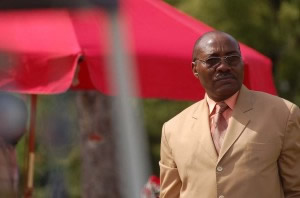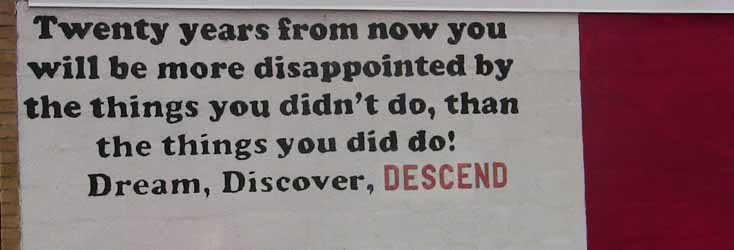home I blog I photography I video I contact
Always a price, even with a free festival
Richmond, VA is home to a diverse array of ethnic communities. Throughout the year, more than 12 multicultural festivals showcase the food, music, and history of these communities. In addition, many organizations and people host benefits to increase social capital for communities outside of Richmond.
Taking stock of the festival
Two weeks after the 40th anniversary of Woodstock, another festival was just beginning: the second annual Richmond Multicultural Day.
The event was hosted by the African Warmth Corporation, a local nonprofit organization founded by Paul Tchouke that brings together different cultures through various activities and educational events.
The driving mission behind each festival was similar: to build a culture of peace through music and diversity. Like Joni Mitchell, who said Woodstock was so successful because its
attendees, "saw that they were part of a greater organism," Tchouke believes that bringing different cultures together will create unity.
"Learning about other places and other people is the beginning of building a culture of peace," said Tchouke.
Unlike Woodstock, at this event there was no rain or nudity, nor was there a large crowd in attendance. Beautiful blue skies and warm temperatures made the day perfect for the 12 hours of scheduled music, although most of the chairs sat empty while class acts like Ban Caribe and the Duke Merrick Band serenaded just a handful of people. Just two years ago the latter, from Charlottesville, played at the wedding rehearsal dinner of Jenna Bush, daughter of former President George W. Bush.
Multicultural Day 2009 took place at Forest Hill Presbyterian Church, and the evening concerts were held inside. There was no admission price. Tchouke said that 517 people were officially counted throughout the day, almost five times more than the inaugural event last year.
The progress of peace making cannot be measured by traditional means. Tchouke certainly was not defeated by the lack of attendance or by the $10,000 he spent hosting the event. He is already making plans for the 2010 event, although it will be more heavily promoted, he said.
"Contributing to the animation of our community is what I love to do," said Tchouke.
Cultural bridges in a vibrant city
Richmond is home to diverse ethnic communities. As of the 2000 census, whites only accounted for 44 percent of the Richmond city population, or roughly 87,000 people. In the five-year period before the 2000 census, 45,000 people had residence in another country, almost a quarter of our population. In Richmond, 6 percent of the population speaks a language other than English.
The Richmond Metropolitan Convention & Visitors Bureau lists 12 major multicultural festivals throughout the year. The Greek, Hispanic, African-American, Indian, Asian-American, Italian, Lebanese, Irish, and Scottish communities are represented.
The upcoming Que Pasa festival, hosted by the Virginia Hispanic Chamber of Commerce (VAHCC) will have an expected 10,000 attendees, said Michel Zajur, founder and CEO of the organization. This event is also free and will be held on Sept. 26, from 12-8pm, at the Science Museum of Virginia.
Zajur, a Richmond native whose parents came from Mexico, believes that the city is becoming a more welcoming place for ethnic groups.
"We are building a bridge, for a new community that wasn't here 10-15 years ago and we can help them to be active participants in the community, by overcoming cultural and language barriers," said Zajur.
"It is important that Richmond highlight its diversity," he said.
Cross-cultural insight
Janine Bell, founder of the Elegba Folklore Society, also believes that Richmond has become more welcoming to ethnic groups.
"During the time I have been here and since the EFS was founded, I have seen much more ethnic diversity and more acceptance, as well as more attendance at events."
This past August 10,000 people attended the Downhome Family Reunion, hosted by EFS for the past 19 years.
"When multicultural events are attended by cross cultural audiences, people get the opportunity on their own terms to explore a culture," said Bell.
When asked if simply showcasing the music, food, and crafts of a culture can actually cultivate awareness and acceptance, or improve social justice, Bell said yes.
"It is a huge affirmation of empowerment and freedom," and "even African-Americans can learn more about their own identity," said Bell.
A benefit is another way to learn about the culture of a group, while the direct participation helps to raise social capital for the group. The diverse ethnic communities in Richmond originate from countries where access to food, education, housing, health care and protection can be extremely limited.
The greater benefit, a direct ripple
For many years, Randi Buerlein, assistant director of field instruction at VCU, has led groups to Ghana, recently helping to build a child development center for the children of Ghana. The benefit that she co-coordinated, FOR AFRICA, raised 50,000 dollars; of that money 30,000 went directly towards the center.
"Donating time, talent and money means you learn something about the group you will be donating to, it becomes more real for the person who is donating and it becomes real on a personal level," said Buerlein.
Benefits and multicultural festivals allow Richmond residents the opportunity to know someone's story: what brought them here, their struggles and strengths, their history. There are plenty of opportunities to discover another culture without buying a plane ticket abroad. But creating a culture of peace will take more than indulging in exotic dishes.
"That is one piece of it. What is more important is the building of relations and dialogue of people with different backgrounds," said Buerlein.
"Multicultural includes people of all walks of life.," said James Tally, owner of the Commercial Taphouse.
"If we can sit down at the same table together and talk about things and not think of our actions as charity, but rather realize that we are all in the human condition together, that's the groundwork there, if we can all care about one another and help one another," he also said.
Tally recently raised an estimated $1,500, with donations still coming in, through a benefit called Foodstock. Posters for the benefit proclaim: For one night out, you can buy her food for a month. Entry to the event was $12 for an evening of local music. All musicians performed for free. The goal behind Foodstock is to provide a minimum of five meals a week to over 600 students in Ouanaminthe, Haiti. Poverty is so rampant, and conditions so desperate, that food for children has to be locked behind bars. The first benefit sent revenue toward the construction of a secure facility to store the food. Revenue from the Sept. 5th event will help build a roof over the kitchen and cafeteria.
Tchouke's optimism is the type of catalyst needed to create something as broad as world peace.
"If we have peace in our community, we will be able to promote peace abroad and we will be able to take care of whoever, wherever, with billions of dollars we are using as of now in wars."
Until we get closer to understanding exactly what a culture of peace is, make sure to sample, celebrate, and support Richmond's rich diversity, thorough benefits and cultural festivals. The reward often has impact far beyond the immediate community.

